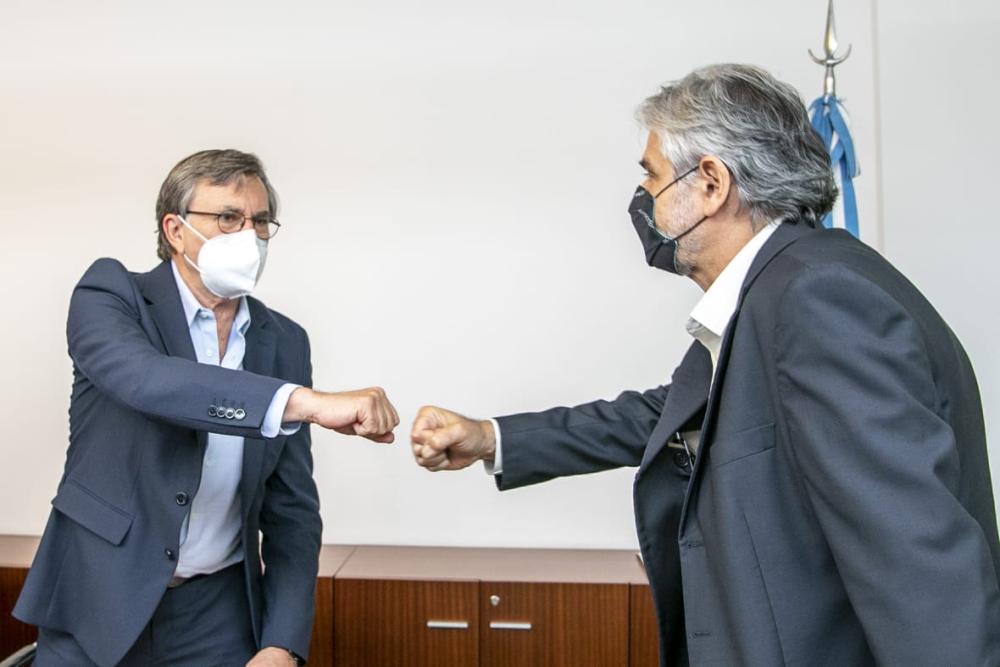Argentina’s Ministry of Science and Technology and IICA join forces to promote the bioeconomy and digital agriculture across the continent

Buenos Aires, 16 March 2022 (IICA) – Argentina’s Ministry of Science, Technology, and Innovation (MinCyT) and the Inter-American Institute for Cooperation on Agriculture (IICA) are to pool their technical capabilities for work on the development of the bioeconomy and the digitalization of the rural milieu and the agri-food sector.
To that end, Argentine minister Daniel Filmus and IICA Director General Manuel Otero signed a cooperation agreement in Buenos Aires that paves the way for the financing and implementation of specific projects in Argentina and across the region.
Prior to the signing of the agreement, a virtual workshop was held in which MinCyT and IICA officials and specialists shared their experiences and visions and established the initial guidelines for a bioeconomy program for the agribusiness sector, which will be carried out under partnerships with the private sector.
During the workshop, Hugo Chavarría, the Manager of IICA’s Hemispheric Bioeconomy and Production Development Program, defined the bioeconomy as the intensive use of knowledge in biological resources, processes, technologies and principles for the sustainable production of goods and services across all sectors of the economy.
“The new knowledge and technologies allow us to make more and better use of biological resources, not only to produce food and commodities, but also biopharmaceuticals, biocosmetics, biofuels and a raft of bioproducts and bioservices that are very high in added value,” Chavarría explained.
The specialist observed that the aim was to harness the physical-chemical qualities of biodiversity and noted that “Argentina and other countries in this continent possess a large proportion of the world’s biological riches. We should be key players in this new development model, so we need to work hard to raise awareness and develop capabilities.”
Argentina’s National Director of Science Policy Promotion, Karina Pombo, stated that the MinCyT and IICA would aim for “concrete results in Argentina and across the region, regarding how the bioeconomy can contribute to development in the rural sector.”
“Our goal is to fund projects throughout the country, encompassing and promoting all Argentine provinces that need to boost production; and to involve other Latin American and Caribbean countries,” she added.
The MinCyT and IICA’s joint efforts will include not only technical cooperation, but also the identification and analysis of potential bioeconomy opportunities and businesses, supported by developments in science and technology in the chains and territories.
Expert Eduardo Trigo, an advisor to IICA, emphasized the need to incorporate the private sector as a key player. “The bioeconomy entered the region through Argentina, the first country to see the opportunity it offered. But its true potential will only be seen when the private sector takes the lead in developing new technologies and approaches”, he said.
Fernando Vilella, Director of the Bioeconomy Program and Professor of Agribusiness in the Faculty of Agronomy of the University of Buenos Aires (UBA), emphasized the need to strengthen human resources through the training of young scientists, and update the regulatory framework to facilitate the development of processes.
“We need to make society aware of the opportunities that the bioeconomy offers so that the community understands it, incorporates it and accepts it.”
The cooperation agreement signed between the MinCyT and IICA also provides for the implementation of joint projects in areas such as agri-food chain competitiveness and sustainability; healthy, sustainable, and inclusive food systems; family farming and territorial development, and climate change and natural resource management, among others.
During their meeting, Filmus informed Otero of the progress of the MinCyT’s work at the Colonia Capitán Sarmiento¾a property located in Mercedes, in the province of Buenos Aires¾where a Scientific and Technological Hub is being set up and the Innovation Center for Sustainable Agriculture already operates.
Accompanying Otero in the meeting at the MinCyT were the Special Advisor to the Office of IICA’s Director General, Jorge Werthein; the IICA Representative in Argentina, Caio Rocha; and IICA’s Advisor on Institutional Relations for MERCOSUR, Ignacio Hernaiz.
Meetings with senior INTA and SENASA officials
During his visit to Buenos Aires, the IICA Director General and his team also met with the President of the National Agricultural Technology Institute (INTA) and the President and Vice President of the National Agri-food Safety and Quality Service (SENASA), Diana Guillén and Rodolfo Acerbi, respectively.
“IICA is committed to collaborating with INTA in building the international dimension of the Argentine research organization. This is being done by providing access to important development and financing programs and mechanisms, such as PROCISUR and FONTAGRO,” explained Otero.
“Working through IICA’s 34 offices in the Americas, we plan to disseminate and transfer all of INTA’s technologies to the rest of the continent”, he added.
The meeting with senior officials at SENASA focused on ways of optimizing animal and plant health surveillance and tackling the challenges of pest and disease prevention in the difficult context of climate change.
More information:
Institutional Communication Division
comunicacion.institucional@iica.int